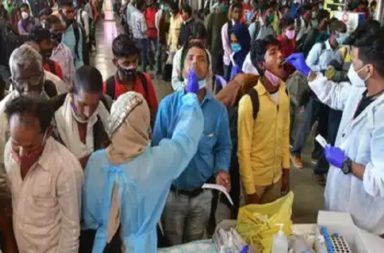In New York City, a four-year-old Malayan tiger at a zoo has tested positive for the novel coronavirus. It is the first case of its kind of COVID-19 transmission from humans to an animal (non-domesticated).
According to the National Veterinary Services Laboratories at the U.S. Department of Agriculture (USDA), the sample of the tigers collected when several tigers showed symptoms of respiratory illness. The name of the tigress is Nadia.
Nadia tested positive for the virus. Her sister Azul, along with two Amur tigers and three African lions developed the symptoms of dry cough.
The tigers got infected by an asymptomatic zookeeper. The zookeeper must have developed symptoms of COVID-19 through which the transmission occurred. The decrease in the intake of food is observed in Nadia and other tigers as well.

Bronx Zoo in New York
What did Chief Veterinarian say?
The Chief Veterinarian Paul Calle for the Bronx Zoo said: “It is the first time we have got this kind of case, that a wild animal has gotten sick from COVID-19 from a human.”
On April 5, the zoo tweets Paul Calle’s statement: “The COVID-19 testing was performed on our Malayan tiger Nadia. The test performed in a veterinary school laboratory and is not the same test as is used for people.”
From Dr. Paul Calle, Bronx Zoo chief veterinarian; "The COVID-19 testing that was performed on our Malayan tiger Nadia was performed in a veterinary school laboratory and is not the same test as is used for people.
— Bronx Zoo (@BronxZoo) April 6, 2020
What did zoo authorities say?
Another tweet from the zoo: “You cannot send human samples to the veterinary laboratory, and you cannot send animal tests to the human laboratories, so there is no competition for testing between these very different situations.”
You cannot send human samples to the veterinary laboratory, and you cannot send animal tests to the human laboratories, so there is no competition for testing between these very different situations."
— Bronx Zoo (@BronxZoo) April 6, 2020
Paul Calle also stated that the transmission of the COVID-19 to animals is only possible from the asymptomatic zookeeper. He said this because the zoo was closed due to coronavirus outbreak for visitors long ago.
What did USDA informed?
The USDA informed that the tiger started showing the symptoms of the initial stage of the infection on March 27. The department clarified that there is no evidence that the transmission takes place from animals to humans. Animals do not play a role in the transmission of the disease to people. It also said that there is no evidence that any person has been infected with COVID-19 in the U.S. by animals, including by pet dogs or cats.
“It was unexpected that the disease will develop in wild animals. Since different species can react differently to novel coronavirus infections. We will continue to monitor the animals closely and anticipate full recoveries,” said the zoo.
The coronavirus was first detected in humans in Wuhan China. In Hong Kong when a handful of animals including two dogs tested positive for COVID-19, it is believed that the transmission can occur from humans to animals. Initially, the pandemic was limited to human transmission. The infection of Nadia raises new questions about human-to-animal transmission. According to the United States Department of Agriculture (USDA), no other animals at the zoo are showing symptoms.

USDA Building
The entire zoo’s across the country is on high alert.
On April 6, The Central Zoo Authority (CZA) asked all zoos across the country to be on high alert. They are advised to collect samples immediately in suspected cases after a tiger at a US zoo tested positive for coronavirus. In a circular to all States and Union Territories, CZA Member Secretary S P Yadav said the United States Department of Agriculture’s National Veterinary Services Laboratories has confirmed COVID-19 in a tiger at the Bronx Zoo in New York.
The case is different and one of its kind. For more detail information we have to do the deep study of the case. Studies will further reveal the hidden facts regarding this case they added.
Zoo across the country are currently on high alert. The animals are in the CCTV observation to detect any abnormal symptoms. The zookeepers and caretakers are strictly instructed to wear the proper safety gear before handling the animals.
Carnivores animals especially cats, ferret, and primates need to be monitored carefully every night. They should be taken care of with all the safety measures required to handle the risk, said CZA member-secretary.
Zoo personnel ask zoo’s across the country to coordinate with the respective government agencies responsible for public health response and screening, P S Yadav added.
Amid the coronavirus outbreak, the whole world is suffering. Even animals are also suffering. The preventive measures and social distancing is the only key to fight with coronavirus.





